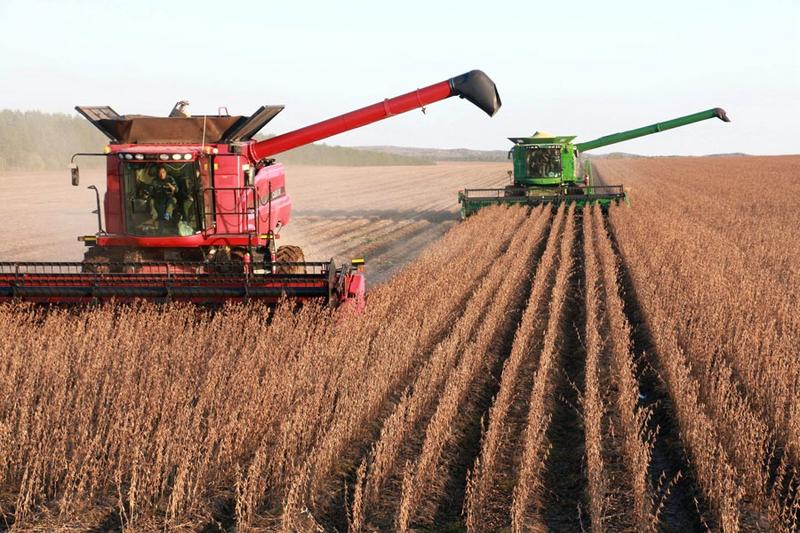Cooperation in agriculture vital for goals of China and US, report says
 Soybeans are harvested in Heilongjiang province. (LU WENXIANG / XINHUA)
Soybeans are harvested in Heilongjiang province. (LU WENXIANG / XINHUA)
More cooperation between the United States and China in agriculture is needed to achieve goals that are of strategic importance for both countries, according to a newly published report.
The report, titled "Finding Firmer Ground: The Role of Agricultural Cooperation in US-China Relations", said that by working together, the two leading economies can help improve global food security, meet China's demand for food quality, address climate change and pursue technological advancement.
The report was released by the US Heartland China Association and the Carter Center.
The US and China are in the position to lead the effort in combating global hunger by increasing agricultural productivity
US Heartland China Association and the Carter Center
It pointed out that 39 countries, most of which are in Africa and South Asia, have alarming levels of hunger. Furthermore, natural disasters, disease outbreaks and human conflict may create short-term food insecurity.
"The US and China are in the position to lead the effort in combating global hunger by increasing agricultural productivity and by promoting economic development in Africa and South Asia," it said.
China can benefit from a working relationship with the US to maintain access to high-quality protein products and feed due to limited land resources, it said, and by collaborating with China, the US can secure a foothold in an expanding market for its agricultural products.
"The US and China have the responsibility and ability to lead the international community to slow down climate change and mitigate its impacts," the report said.
The US Heartland China Association is a bipartisan organization committed to building stronger ties between 20 states in the US heartland and China. The Carter Center is a nongovernmental, not-for-profit organization founded in 1982 by former US president Jimmy Carter.
After joining the World Trade Organization in 2001, China quickly became one of the US' most important trading partners in agriculture. In a swift and powerful shift, China's share of US agricultural exports increased from 2 percent in 2000 to roughly 16 percent in 2014.
The trade was later disrupted, and volume dropped dramatically in 2018 and 2019 due to the US-initiated trade conflict. However, sales climbed to a 17.6 percent share in 2020, and China ranked first among all US agricultural export markets with sales of US$26.4 billion, representing an increase of US$12.6 billion over 2019.
From China's perspective, the US ranks No 2 in agricultural imports with a 15 percent market share after Brazil, with 22 percent.
While growing mutual mistrust and hostility have driven the bilateral relationship to a low point, a recent Ag Barometer survey by Purdue University and CME Group showed that 92 percent of the farmer respondents agreed or strongly agreed that it is important for the US to maintain a healthy economic relationship with China. Despite that belief, they also showed increasing pessimism on the prospects for an increase in US agricultural exports over the next five years.
Improving collaboration
The report proposed ways to improve collaboration between the US and China. The suggestions include resuming and enhancing high-level agricultural talks, reducing tariffs and other trade barriers, building infrastructure to strengthen international and domestic supply chains, and increasing research collaboration and educational exchanges.
In the foreword to the report, Kenneth Quinn, president emeritus at the World Food Prize Foundation, recalled his involvement in US-China agriculture exchanges beginning in 1980, when he escorted Guangdong's then governor Xi Zhongxun to the office of Iowa governor Robert Ray, as well as to Iowa State University, the Amana Colonies, and seven villages in Iowa.
In 2004, Quinn presided at a ceremony at the Iowa State Capitol in which Norman Borlaug presented the World Food Prize to Professor Yuan Longping, the "Father of Hybrid Rice" and one of the most significant agricultural scientists in the history of China.
In 2012, as president of the World Food Prize, Quinn hosted the US-China High Level Agricultural Symposium in Des Moines, at which Chinese President Xi Jinping, who at the time was vice-president, delivered the keynote address.
"In my view, that February 2012 visit to Iowa by President Xi Jinping represents the high point in the US-China agricultural relationship since the establishment of diplomatic relations," Quinn said.
Quinn said he was disappointed as he "watched as a succession of irritants, disagreements and adversity diminish the friendly spirit that had previously been so prevalent".
Believing that agricultural cooperation is the most likely route to reversing that downward trend, he proposed and helped organize a high-level bilateral Agriculture Roundtable in April this year. The report drew on ideas generated at the discussion.


